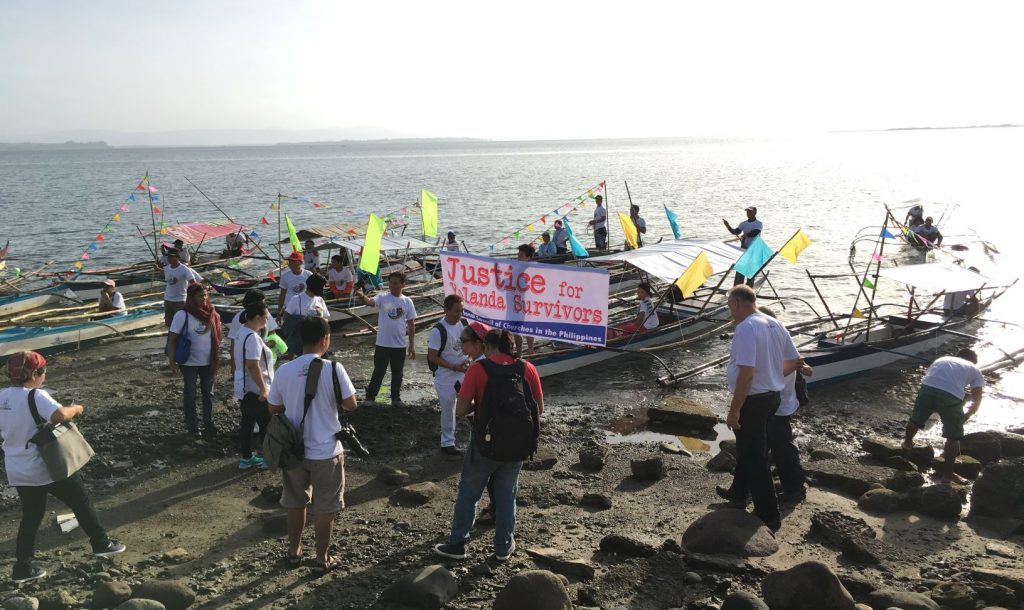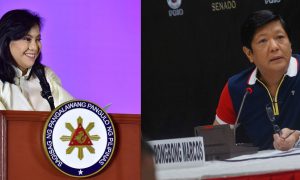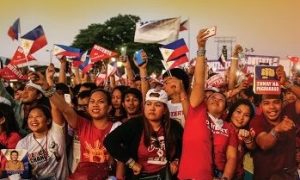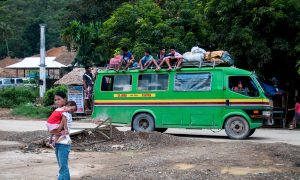Nicole Curato offers a hopeful story of everyday practices of democracy enacted by disaster-affected communities during populist times. This is an abridged version of the prizewinning book Democracy in a Time of Misery: From Spectacular Tragedy to Deliberative Action (2019, Oxford University Press). This piece is available in Waray.
“In the fullness of God’s time, I will be back.”
It was a humid Wednesday afternoon, in a makeshift stage in front of a mass grave, when Philippine President Rodrigo Duterte made this promise to the people of Tacloban. In his speech, he assured typhoon survivors that help will come, that he will personally see to it that families will have a roof over their heads, that there should even be a swimming pool, because the people who survived the world’s strongest storm deserve nothing less.
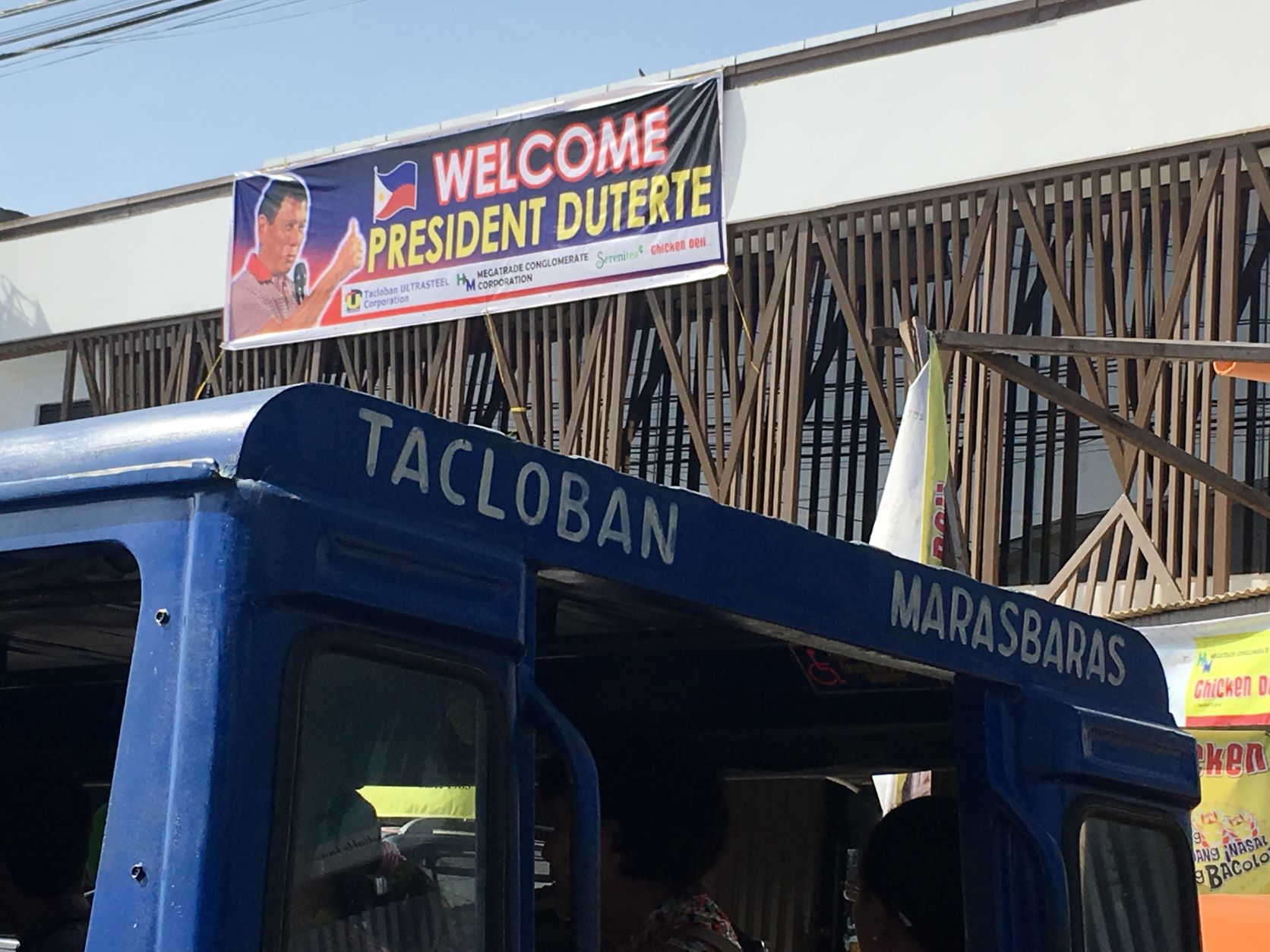
Image by Nicole Curato, supplied by the author.
He made this promise on the eighth of November 2016, the third anniversary of Typhoon Haiyan. He had only been president for four months.
Two years later, the President returned to a city seemingly back on its feet to celebrate the Festival of Lights. In between visits, new homes were turned over to families neglected for years. Road repairs and flood control structures were completed. A new airport project was even approved.
The story of a compassionate yet strong-willed President is the story that makes Rodrigo Duterte the most popular president in recent Philippine history. Never mind that this is the same man who literally called for the genocide of all drug addicts. Never mind that as commander-in-chief, he told his soldiers to shoot female rebels in the vagina. Never mind that he pulverised the Islamic City of Marawi in Southern Philippines to the ground. And never mind that he is a self-confessed murderer. Three years into his term, the strongman enjoys a trust rating of 85%, a figure that other world leaders could only dream of.
After the storm, a strongman
Many observers lament the state of Philippine politics today. Some say that authoritarian nostalgia has taken over, for over thirty years of elite democracy has done little to uplift the country out of poverty. It is no accident that Duterte is well-loved in Tacloban, the hometown of the late dictator Ferdinand Marcos’s wife, Imelda. There was a time when food and drink flowed in the streets of Tacloban during the Feast of Santo Niño. The country’s longest bridge, that connected the islands of Leyte and Samar, was built in the 1970s as a birthday gift to Imelda. When the Marcoses were kicked out of power in 1986, Tacloban, an aspiring politician told me, became a city “people find easy to ignore.” This feeling of neglect intensified in the aftermath of the storm, when many were left homeless, hungry, and grieving the death of more than 6,000 people.
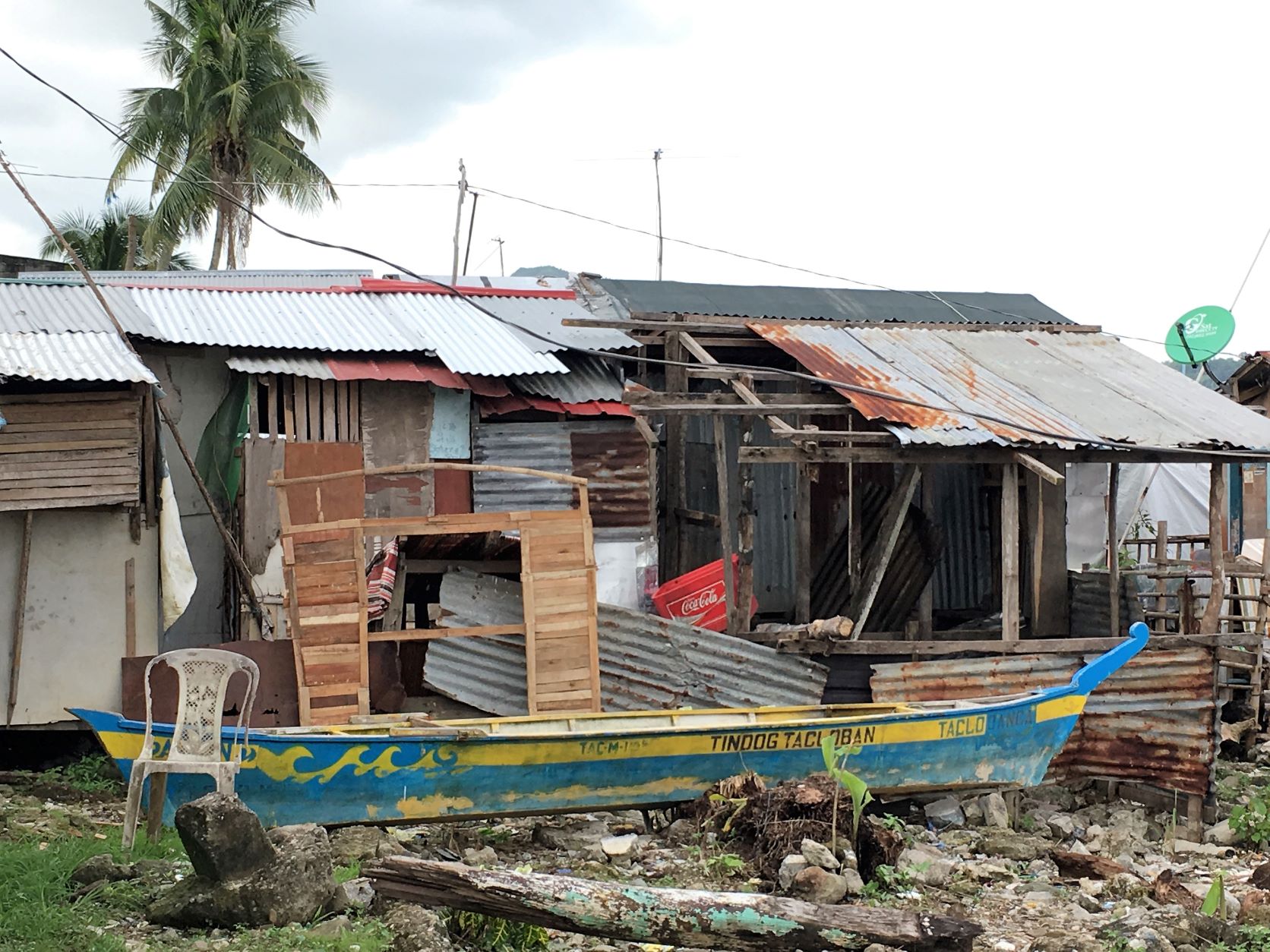
Image by Nicole Curator, courtesy the author.
Duterte’s rise to power signals the allure of a man who can get things done. The powerful combination of gangster charm and can-do attitude lays bare the weaknesses of a democratic system associated to his predecessors that privileges bourgeois courtesies and a system of checks and balances that slows down progress. Coupled with an army of trolls and a super-majority in the House of Representatives, the Philippines, so the story goes, has turned its back to democratic life and embraced Duterte’s illiberal project for the sake of shared prosperity.
This observation is valid, but it is not complete. Politics is never a single story. To portray the Philippines as a country that has surrendered its fate to a strongman ignores the many, varied, and sustained attempts of ordinary citizens to take over their collective destiny. Amidst constraints of economic precarity, threats of displacement, and relationships of patronage, are everyday efforts to render the poor’s suffering visible, to get their demands heard, and imagine better futures for a people that, indeed, have become easy to ignore. There is more to Philippine politics than the antics of Rodrigo Duterte.
I witnessed these efforts firsthand when I conducted field research in some of the poorest communities in Tacloban. Over three years, I followed protest movements and young activists, mothers who mastered the art of hustling to make ends meet, and community organisers determined to translate “people-led recovery” from slogan to action.
The people I met have different political views. Many of them love Duterte because he has been kind to them, but many have also grown skeptical of any politician who makes promises. All of them understand that they need to take matters in their own hands if things were to change, even if that means putting aside their trauma from losing their loved ones in the typhoon so they can fight for their right to survive.
There are many lessons I learned from them, but here are some of the most memorable ones. They, to me, serve as inspiration for democratic action in times when politics seems to be nothing more than cheap rhetoric and empty promises.
The importance of staying angry
First, I learned the importance of staying angry. On the 100th day after Typhoon Haiyan struck, over 12,000 protesters marched to downtown Tacloban to express their grievances. This was the first mass action of this scale in decades. The protest movement People Surge demanded better treatment from the state and called for accountability over the government’s “criminal negligence.”
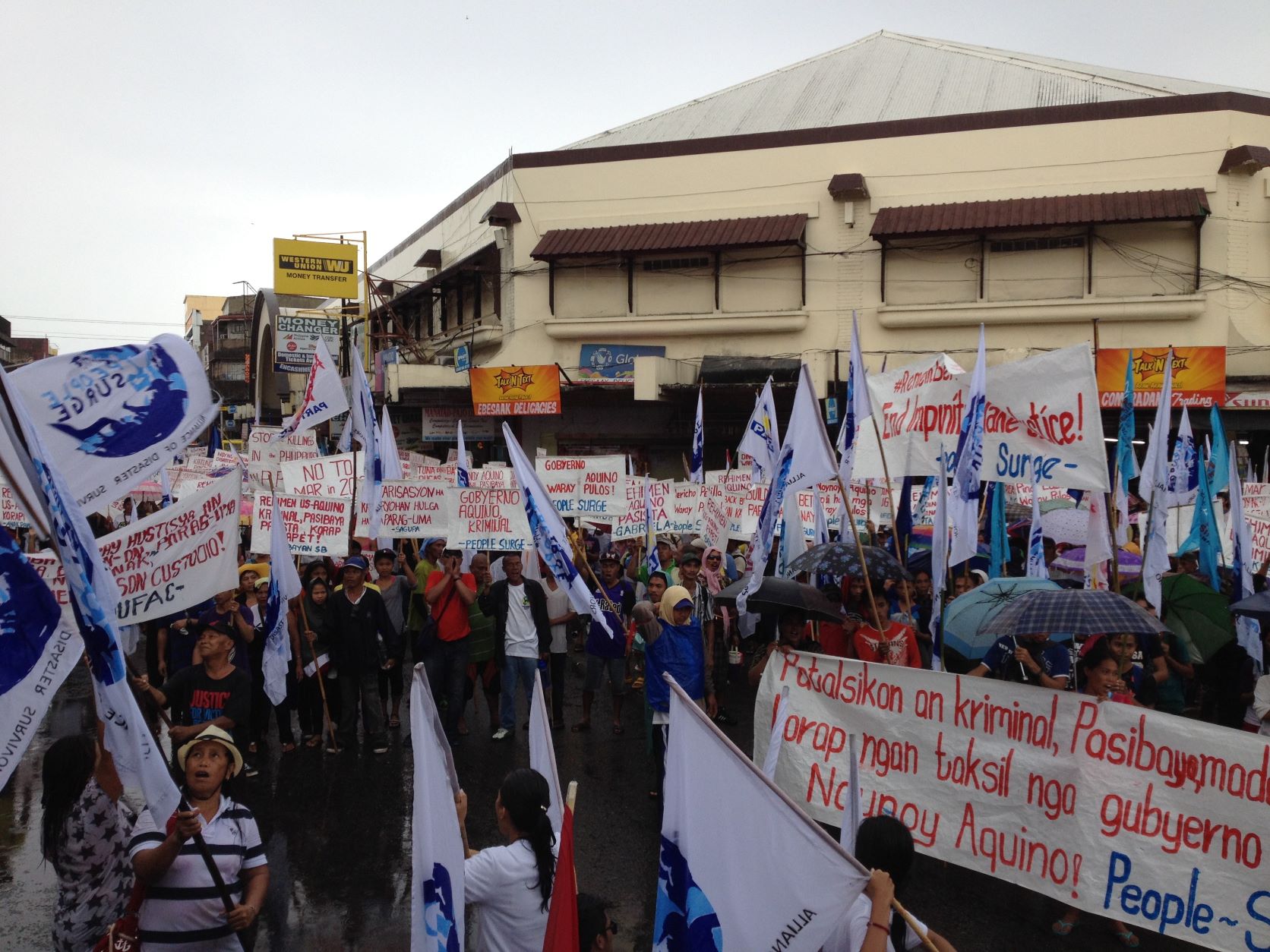
Image by April Porteria, courtesy the author.
Since 2013, People Surge has organised activities in Tacloban and Manila to remind the powerful that their “survival is not negotiable”. They tried to draw attention to their demands through colorful protest action. They had a press conference timed on April Fool’s Day to expose how the government fooled the people. On Good Friday, they joined the clergy over a meal likened to the Last Supper, where disaster survivors played the role of Jesus Christ, their supporters were the apostles and the government was Judas. On the anniversary of the typhoon, they laid a wreath on the mass grave, with the words “Justice” inscribed on a ribbon.
When Duterte took over, People Surge’s anger did not waver. “We are more than ready to occupy once again the streets of Tacloban,” the group’s spokesperson warned, for they found Duterte’s quick action on rehabilitation programs was a foil for selling the city to investors “profiteering from the people’s vulnerability to disasters.”
Six years after the typhoon, People Surge remains indignant. Anger can be mobilised by populist leaders to divide societies, but anger can also transform people’s experiences of humiliation and despair to collective demands for better treatment.
The importance of getting organised
The second lesson I learned is the importance of getting organised. The first time I visited the headquarters of Urban Poor Associates in Tacloban, I saw two women clutching sharpies as microphones, practicing their dialogue with a city councilor about impeding evictions in the coastal town. The women’s voices were soft, but they were articulate. With the guidance of a community organiser, they were slowly gaining confidence to speak to people in power.
This episode is just one of a series of Urban Poor Associates’ initiatives in Tacloban. The center of activity is a twelve-hectare property in a village twenty minutes away from downtown. This is the site of Pope Francis Village – a “model community” for people-centered rehabilitation. While most post-disaster housing projects were donated by philanthropic organisations or built by the government’s housing agency, Pope Francis Village involved communities in every step of the housing project.
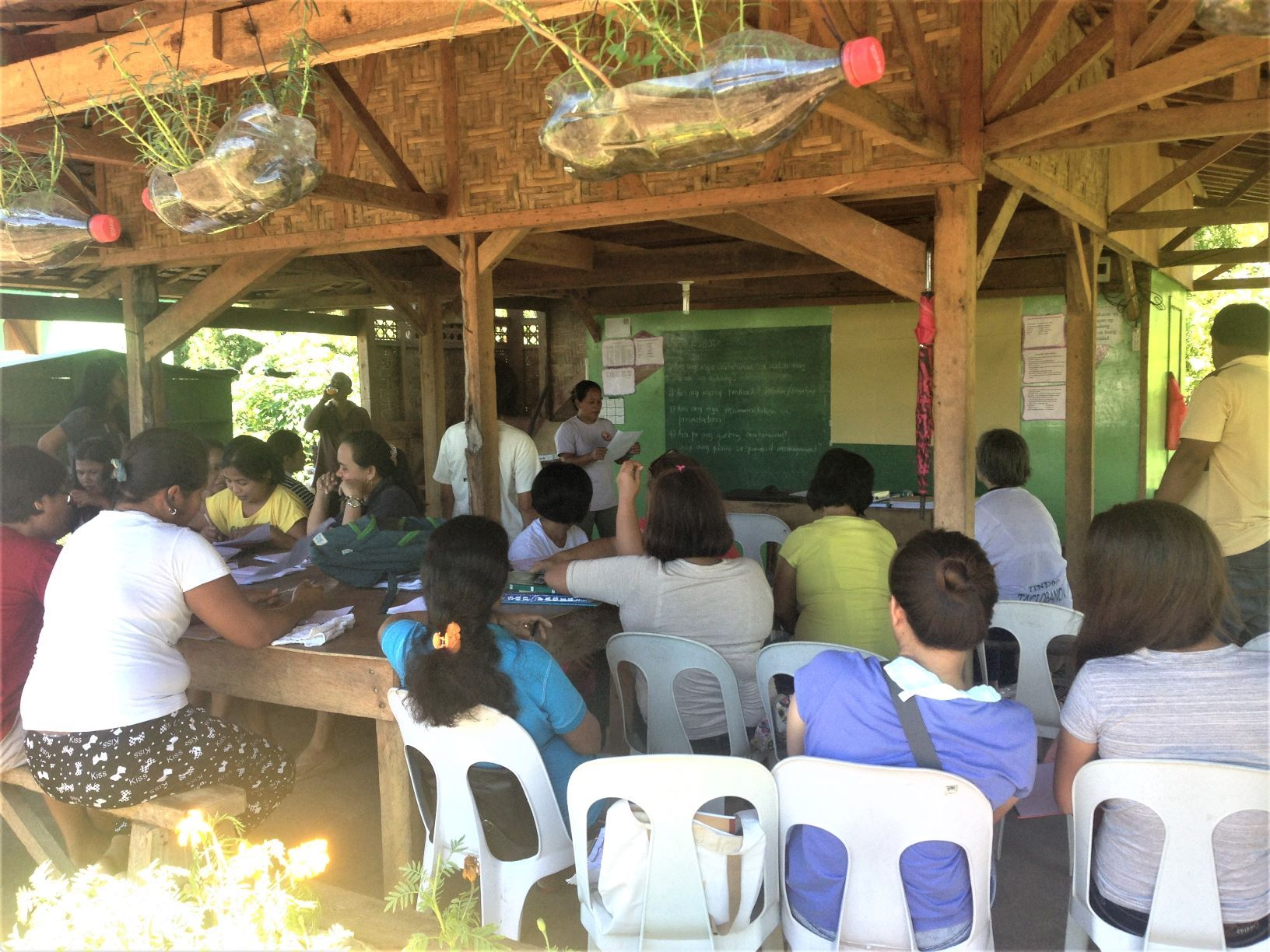
Image by Nicole Curator, courtesy the author.
The partnership that developed between community organisers and disaster survivors was central to this project. Former residents of Barangay San Jose were organised to take part in a series of meetings to decide on the “selection criteria” of households who will receive homes first. They had discussions on the type and make of houses and eventually decided to build row houses instead of a more spacious quadruplex so more families can receive homes. The community also agreed on their roles in building the community. Some were in-charge of looking after the finances, others trained for livelihood programs, while there were those who volunteered in construction.
I learned a lot from observing this community, but the message that struck me the most is the undervalued role of everyday democratic labor in sustaining efforts at collective action. People-centered rehabilitation takes time, attention and resources to work. Orchestrating all this are committed democratic actors. These are not the larger-than-life populist leaders but the community organisers, volunteers, and households, all of whom pulled their weight to make a housing project work for all. It is the seemingly mundane efforts of organising meetings, running capacity building workshops, and holding forums for collective decision-making that shatters the sense of resignation among people who have felt beaten up for decades. Everyday political action demonstrates that democracy can work amidst constraints, in the aftermath of a tragedy.
The importance of global solidarity
Finally, the value of solidarity. In the slum communities I visited in coastal Tacloban, I noticed households displaying a green coin bank with the label “Accumulating Goodness to Mitigate Disasters”. The coin bank was from the Buddhist Tzu Chi Foundation.
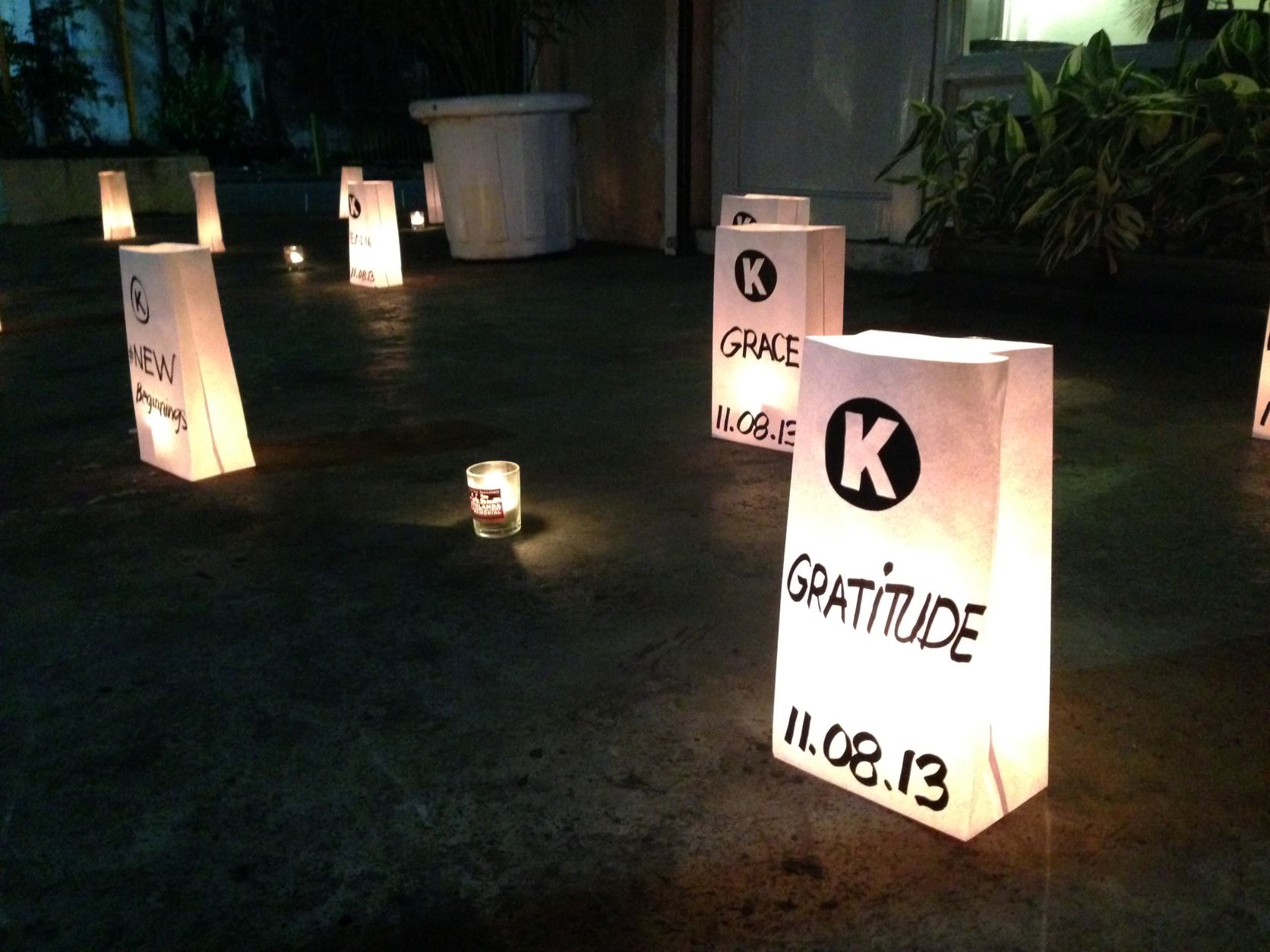
Image by Nicole Curator, courtesy the author.
After the typhoon, Tzu Chi Foundation was among the first to be on the scene, giving cash grants for households involved in clean-up operations. They were even more loved for distributing what my respondents describe as “rich person’s rice”, which is a stark contrast to the relief goods distributed by the government that are past their sell-by date. After losing everything from the typhoon, families had to scour whatever resources they can use—drift wood, tarpaulins, plastic bottles—to build makeshift homes. Tzu Chi’s kindness of giving cash gifts and decent meals restored the esteem of disaster-affected communities who felt that they lost their dignity after their ordeal.
Tzu Chi’s kindness followed the logic of pay-it-forward. Beneficiaries of their aid were expected to put in a few coins in the jar, which will be collected by their representatives every now and then. The proceeds of the coin bank drive will be sent to other disaster survivors around the world. It is a fascinating case of inter-survivor accountability. There is a grassroots ethic of cosmopolitan solidarity where precarious communities consider it their responsibility to look after each other. A respondent once sent me a text message, asking whether the storm in Nepal “was not fake news” because she could spare five pesos to help their recovery. This practice will outlast any populist leader if it is built on the most basic human principles of care, gratitude and reciprocity.
The Philippines beyond Duterte
In the aftermath of Typhoon Haiyan, resilience has become a buzzword describing the people of Tacloban. I have witnessed how people’s daily lives are a constant struggle for survival, defined by mutual care, the desire to play fair, and the determination to live a dignified life.
Many may have been turned off by democracy, but Tacloban’s stories of anger, collective action, and solidarity give me a sense of perspective. Yes, the Philippines is a country that continues to support a President willing to kill and offend for the same of his bloody war on drugs. Yes, this a country divided by political persuasions, further divided by corrupt and opportunistic politicians.
But the politics in the Philippines is not limited to politicians. Every day, the poorest communities improvise ways to make democracy work amidst constraints, and it is from them that, in democracy’s trying times, our society can draw inspiration.
 Facebook
Facebook  Twitter
Twitter  Soundcloud
Soundcloud  Youtube
Youtube  Rss
Rss 